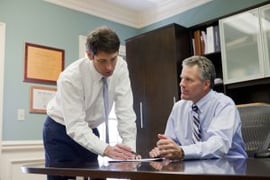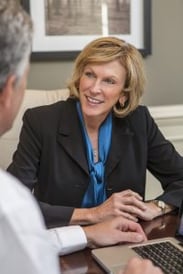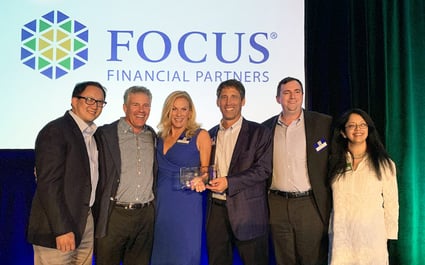CONSERVE. PLAN. GROW.®
Malcolm Butler’s History of The Fiduciary Group: 2000 – 2020
March 29, 2020
It has been about two decades since my father, Lee Butler, wrote the history of the first 30 years of our firm. At the end of his story, he left it to me to write my own account of the firm’s history from that point forward. It has been a great run over the past 20 years and, even during these unprecedented times, I have never been more convinced of the positive prospects for the firm — and for our clients — for the next 50 years.
As we continue to experience the economic, social and psychological impact of the COVID-19 (coronavirus) pandemic, it is more important than ever to ever to take a long-term perspective. We believe it is an honor to work with our clients, in good times and in bad times. As a dedicated team of fiduciaries, we are here to help and to look out for our clients’ best interests.
During 2001 and 2002, the country was going through a recession and struggling with the consequences of the dotcom bubble. Fortunately for our clients, we had never embraced investing in companies with great dreams but no earnings, so client portfolios weathered the downturn without enduring the dramatic losses that took place in the tech sector.

In 2003, Joel Goodman joined the firm. Joel had been working for a Wall Street investment firm in Baltimore and wanted to return to Savannah with his wife and young family. With his Duke MBA and CFA designation, Joel not only brought great skills to the firm, but helped to enhance the credibility of the firm’s investment capabilities. As we were now decidedly focused on portfolio management as a core strength, Joel was the right person to serve as Chief Investment Officer and lead the charge of refining our investment strategy and methodology and building out a world-class investment team of analysts. He also has been highly successful in attracting and managing new client relationships.

While the firm continued to serve its clients well and grow at a reasonable pace in the early 2000’s, I knew that we needed to improve our operational processes and infrastructure and focus on long-term business strategy and growth. Julia Butler came into my life in late 2004, and I brought her into the firm in 2006. There were some concerns about bringing my wife into the firm, but she quickly won the respect of the entire team. She had had a successful career as a business innovation specialist for a Fortune 500 firm, so she was ideally suited for the task at hand. Julia undertook a serious and thorough review of all our systems, processes, and roles and responsibilities, and made recommendations for improvement. We adopted all her recommendations including changes in workflow and responsibilities as well as technology. It was also during this time that we changed the firm’s name from Fiduciary Services Corporation to The Fiduciary Group. In the ensuing years, Julia became the firm’s Chief Operating and Compliance Officer, and she also started and continues to lead our firm’s 401(k) advisory practice.

Scott McGhie showed up in 2008 at just about the time the entire financial world was collapsing. Scott was an investment analyst with a Wall Street firm and a CPA as well. He had already begun the effort to earn his CFA designation which he accomplished within a few years of joining us. Scott immediately took charge of trading and has proven his leadership over the years in portfolio construction and management. Markets were extremely volatile in 2008 and the stock market was off over 40%. It was not uncommon for client portfolios to suffer 20% declines that year which meant we were all having daily conversations with anxious clients. During this time, we focused on avoiding excess concentrations in financial stocks (which is where the major meltdowns were taking place), maintaining our allocations to fixed income, and increasing cash positions. This required a lot of time from our team, all the while providing handholding to nervous clients. Scott was instrumental in helping us find attractive, high-yielding bonds that provided good cash flow and lessened portfolio volatility.
While we did not know it at the time, we were about to experience the greatest investment opportunity in decades starting in March 2009 when markets bottomed. Thanks to all the diligent and concerted efforts to improve investment processes and workflows in the prior few years, we were in an excellent position to take advantage of the bull market opportunity. With our expanded investment team and improved portfolio management software, we were able to more efficiently invest client assets and provide meaningful reporting to clients. Our high-performing team was able to construct portfolios that were appropriately diversified with high quality stocks and bonds. These portfolios enjoyed the rewards of a rapidly rising stock market.
While markets were gyrating wildly in the 2008-09 time period, I attended an investment conference and met the CEO of Focus Financial Partners. He had an interesting business model and had recently launched a firm that would go on to become the world’s largest partnership of independent investment advisory firms. Focus is a strategic investor in registered investment advisory firms, providing value-added support and best practices, access to capital for growth, and succession planning for continuity, while allowing each partner firm to retain its independence, leadership, vision, and legacy. I was quite intrigued by the CEO’s mantra: “We don’t want to turn successful entrepreneurs into employees.” After that conference, one of the Focus associates began what would end up being a 7-year courtship, culminating in our entry into the Focus partnership in April 2015.
When we first met the Focus team and learned about the business concept, we recognized we had more work to do before joining a group of much larger, nationally elite advisory firms. We no longer wanted to simply be a successful family-owned business. In the ensuing years, we doubled down on efforts to improve processes, grow our talent pool and capabilities, expand our service offerings and enhance the client experience to put us on track to become a world-class investment advisory firm. During this period, Joel and Scott became equity partners in the firm. Through a lot of hard work and contributions by all our team members, by the time of the Focus transaction in 2015, we had successfully completed this phase of our business transformation and were positioned to capitalize on the many value-add resources that a Focus partnership would bring.

As of this time, we are in a stock market decline that is unprecedented in its swiftness. Countries around the globe are dealing with the spread of the COVID-19 virus, and the preferred solution has been to self-quarantine and limit social interaction. This has resulted in an extraordinary number of businesses shutting down to keep their employees and customers from interacting as much as possible. This “social distancing” cure will likely bring on a global recession. Hopefully sooner rather than later, we will all return to work and school to resume our normal lives once again. Just as we’ve experienced over the last 50 years, we expect markets to respond with resilience.
Our commitment to continuous learning and innovation and unwavering devotion to excellence in all that we do is a theme now deeply embedded in our culture. This commitment will continue to serve as the backbone for growth and continued success in the future.
I am exceedingly proud that over the last 20 years we have built, and continue to build, a high-performing team of skilled and talented professionals who work collectively to serve our clients. For a firm our size, it is remarkable how many have advanced degrees and designations. Twenty years ago, we had 7 employees working in the firm. Today we have 14 professionals, among them four Chartered Financial Analysts, two CERTIFIED FINANCIAL PLANNERTM professionals, two CPAs, and four MBAs. The breadth and depth of our team’s expertise and the collaborative working culture of our firm is what, in my opinion, sets us apart and allows us to provide better outcomes and more meaningful solutions for our clients’ wide-ranging needs.
I cannot conclude the history of our firm from 2000-2020 without recognizing that the real secret to our success is our clients. The meaningful relationships we have with the people and families we serve and the personal reward we experience in helping them achieve their goals is why we enthusiastically complete our work each day. We have also been fortunate to work with other great professionals in the legal and accounting professions. We constantly strive to be accessible and responsive to our clients and the legal and accounting professionals who serve them. We owe the growth and success of our firm to the loyalty of, and referrals from, our clients and the surrounding legal and accounting community.
For the past 50 years, our firm has always put the needs and concerns of our clients first. This is, after all, the central and most important factor in being a true fiduciary. It has only been in the past few years that the word “fiduciary” has become fashionable in the investment community and media. In looking back at our firm’s history, I have to smile when I reflect on the fact that the firm my dad founded five decades ago was not only at the vanguard of an important movement to put client interests first, but since our earliest years, we have included the often-mispronounced word “fiduciary” in our firm’s name!
In 2020, we celebrate 50 years of fiduciary wealth management with a clear vision for the future. Despite the serious challenges the coronavirus pandemic currently poses, I am confident that the next 50 years will see even greater success for our clients, our team and our partners.
With this, I will leave the next chapters to be written by future generations of our firm’s leaders.
Malcolm Butler, March 27, 2020
